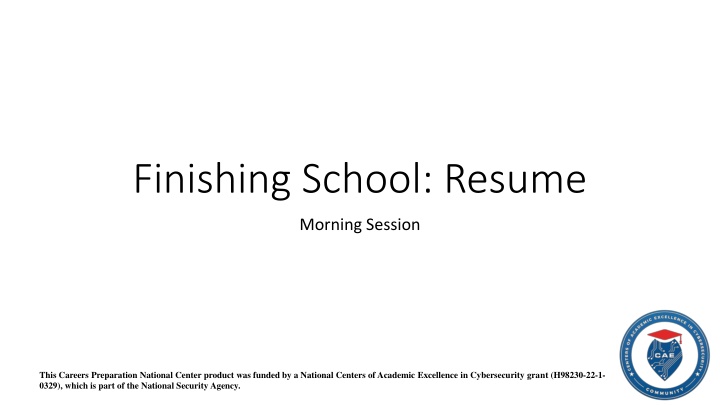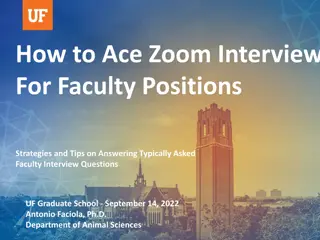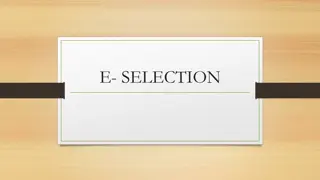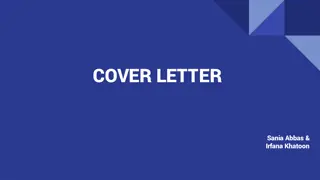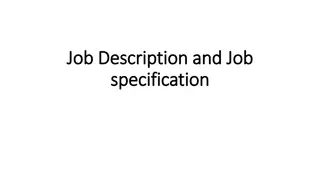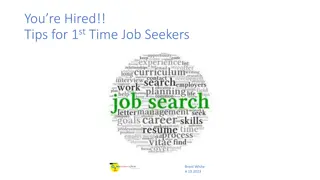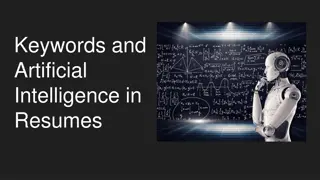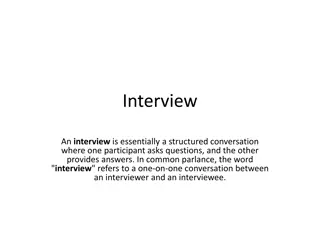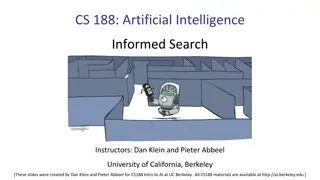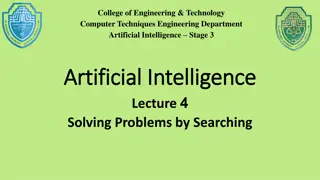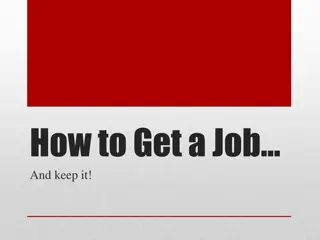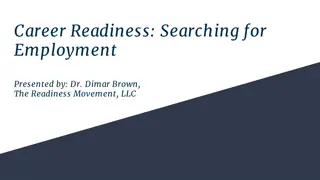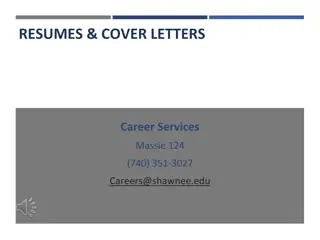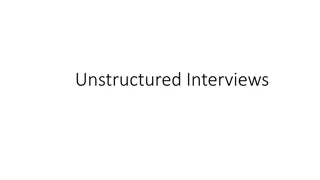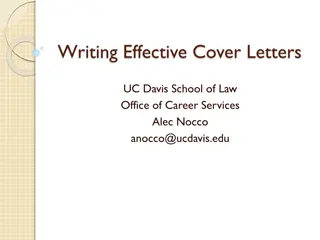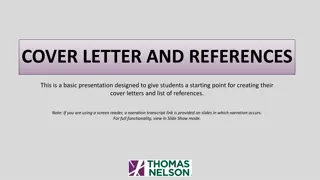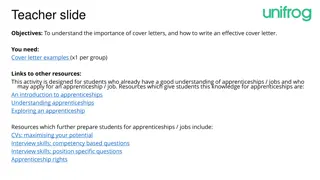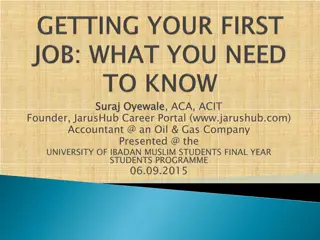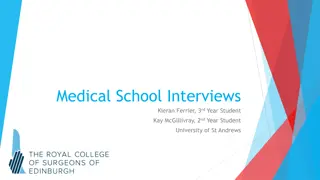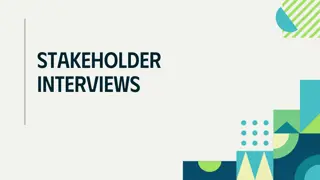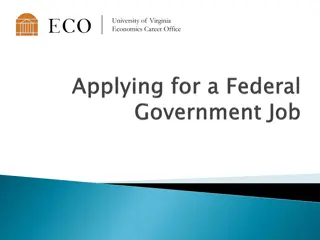Job Search Tips: Resumes, Interviews, and Cover Letters
Learn valuable job search strategies, including resume tips, interview preparation advice, and cover letter guidelines. Discover the importance of research, job hunting tactics, and following up after applications. Enhance your chances of landing your dream job with these comprehensive tips.
Download Presentation

Please find below an Image/Link to download the presentation.
The content on the website is provided AS IS for your information and personal use only. It may not be sold, licensed, or shared on other websites without obtaining consent from the author.If you encounter any issues during the download, it is possible that the publisher has removed the file from their server.
You are allowed to download the files provided on this website for personal or commercial use, subject to the condition that they are used lawfully. All files are the property of their respective owners.
The content on the website is provided AS IS for your information and personal use only. It may not be sold, licensed, or shared on other websites without obtaining consent from the author.
E N D
Presentation Transcript
Finishing School: Resume Morning Session This Careers Preparation National Center product was funded by a National Centers of Academic Excellence in Cybersecurity grant (H98230-22-1- 0329), which is part of the National Security Agency.
Welcome Welcome! Today we are covering: Resumes Interviews There will be a lot of interacting, so be ready!
But FIRST! Go a step further than the job finder site Remember you are competing in the job market! Do your research Visit the company site, see if the job posting is there Apply directly to the site when possible Compare the postings, you should build your resume to the company site posting if they are different (unless the job site posting was posted earlier) On Job Hunting Take advantage of events Community events Job fairs Virtual meetups Use the internet to your advantage LinkedIn Profile www.dice.com www.glassdoor.com www.indeed.com www.monster.com www.usajobs.gov Google!
Job Hunting Pt. 2 Remember, look for jobs you will enjoy doing Look for companies you ll enjoy working with Be mindful of career growth If you can t line up your skills perfectly, DON T Worry Match up what you can See how to develop the skills for the rest If you feel it s not too far off, something you are willing to learn, apply anyway! Showing desire to grow is a great thing! You can use resume builders May be more useful for federal resumes But don t stop there, they are just a starting point! After applying, follow up! Give it a reasonable time, expect communication within 4 to 7 business days for an application Thank them for the opportunity (it may sound weird, but it is a welcomed change from most applicants and shows appreciation, another excellent trait)
Letters, Letters, Letters Cover letters should be no longer than 1 page Roughly 3 paragraphs Structured as: Date & Contact Information Salutation/Greeting Opening Paragraph Descriptive/Connection Paragraph (Middle) Closing Paragraph Complimentary Close & Signature (friendly yet formal) Once you ve identified a job Start thinking about a cover letter Even if not required, write a cover letter This helps show your intent It allows your potential employer to get to know you and your background a bit more It could even help in the interview process It shows initiative, if not required Each should be unique and tailored to the job role
Formatting your letter Ensure you use a font like: Arial Calibri Verdana Times New Roman Avoid fancy, decorative, or odd fonts Employers may use software to automate Your font style can cause issues with identifying key words 10 or 12 size font, keep consistent The letter should be single spaced with a space between each section. No indents. Aligned to the left.
Resumes, the Living Document Resumes are not dead. Or at least they shouldn t be. Your resume should be a living document A Polymorph Your resume should not only grow and sharpen, but also meet the specific demands or expectations of the job it is applied to When was the last time you edited your resume? How much have you changed since?
The importance of a Resume Resumes: Serves as 1st impressions Summarizes your professional background They showcase relevant skills and experiences Relevant to the job Helps facilitates screening process Serves as the basis for interview discussions Which gives you an advantage Reflects your professionalism if done well Helps you track your career
Resume as an Evolving Document So think of it differently! Like an evolving document. As an added bonus, it could also be used as a networking tool! Useful for job fairs and mentorships Here s the catch! Resume building is a skill and you have to constantly develop it! So Let s start
Essential Components Skills Here are some key components of a resume: Contact Information Phone number Email Address The City and State Where you Currently Reside Professional Objective or Summary These should be brief 1-2 sentences for an objective 3-5 sentences for a summary Professional Experience Position Title, Employer, Location, DoE Brief bullet points In relation to the position you are applying for Be Honest Education Recent grads/students should place this above professional experience Of course it should be structured and organized As well as formatted properly and checked for spelling errors Try to keep to 1 page for less than 5 years of experience. For more try to keep to 2-3 pages Else build a portfolio
Customizing Information In the previous slide you may have noticed a part under Skills about updating it to fit the job application This goes for almost all the other parts Your professional objectives should be relevant to the job you are applying to Even prior experience, if you can highlight responsibilities and duties to support your updated skills, your resume will connect stronger. Again always be honest! Always keep track of your career history and works completed.
Knowing the Audience There is a difference between industries on expectations of resumes. It is important for you to build your resume in a way that will capture your audience. For instance, a federal resume will look quite different from one submitted to a cybersecurity firm, art gallery, or even a local government office. Be sure to do proper research into the organization or industry that you are applying to get into.
Choosing the Right Format It s important to know your audience so you know how to build your resume. Again, a federal resume will look very different from a resume you d submit elsewhere. It is important to know what is required. The format you build earlier is a great general resume, but let s look at the federal resume format
Format Types Federal 1. Include Citizenship, pay grade, announcement from USA jobs 2. Should be multiple pages 3. Clearance if you have it 4. Revise the resume to be very specific to the job announcement 5. Include Month/year start/end for each job listed - counts for required experience, Annual salary, Number of hours/week worked 6. Designate if they can contact. You can specify that they should ask before contacting supervisor or they may contact 7. SAR method - Situation Action Result - Bullet points that are focused for the job descriptions 8. Skills -target exactly what they are looking for 9. Highlight Collaboration, communication. Problem solving 10.Level of expertise - Compared to other people who would be applying for this position. Other GS-7 not GS-12 (look @ OPM for GS as a resource) 11.How to apply - assessment Questionnaire 12.Education, degree, date conferred/or suspected finish & hours earned, relevant coursework, GPA, Honors, Certification. Date issued, Expiration, include transcripts 13.Volunteer experience, certifications, awards, affiliations/organization involvement 14.Some positions require Resume Builder @ USA Jobs https://www.usajobs.gov/ https://www.usajobs.gov/help/how-to/account/documents/resume/build/
Crafting Right Resume for the Job While these resumes seem differently, they really convey most of the same information As we discussed in the previous session, how you craft your resume is a reflection of your professionalism. So, do it with due care Pay attention to job postings Understand the wordings and see how it relates to your skills Know your audience and how to communicate.
Competencies Have you ever wondered how to communicate my skills that I developed in the classroom to the professional world? Then this is the thing for you! A competency is the ability for the individual to complete a task or tasks within the context of a work role. Take a moment, research a job, specifically the tasks within the job. Can you identify quality work (not just papers or quizzes) that you have completed that could showcase an understanding of that task?
Communicating Competencies Now we have to communicate them. This is easier than you may think! Communicate it on the resume, by highlighting those skills When it comes to the interview, you will be ready with an example of how you evidenced that skill Relating your ability to the needs of the job displays a sense of understanding, preparation, & confidence.
References & Work History References should be available on request on your resume More often than not, you will have a place to submit a references page Or you may have to manually enter them into an application Use that space to better introduce yourself! Similarly, keep your work experience to 2 or 3 job roles All else should be on a work history document, that can usually be uploaded to an application as well
Activity Earlier you developed skills and researched a job title Make a copy of your modified resume. Reevaluate your resume Does it fit the job role? Does it touch on important requirements for the job? If it does, great! If it doesn t, now you know what skills you need to obtain to get to where you want to go!
Conclusion/Summary Resumes are living, evolving documents. It is our job to keep them up to date They should be honest, but specific to the job it s being applied to Skills you are developing now, can translate to the workplace You just have to communicate that Resumes are a great way of tracking a career As well as seeing what I need to do to get where I want to go. Remember! Submit your documents as PDFs, not a document file.
Finishing School: Interviewing Afternoon Session
Welcome Back! We hope your lunch was great! Did you look at your resume more? Did you think about other job positions? Or maybe how to get the few missing skills to get where you want to go? Well, we are going to talk about what you have to do after your resume gets you in the door!
The Purpose of Interviews This may seem like a silly slide We probably think we know interviews are important But do we understand their purpose? Beyond just assessing your qualifications, it serves to evaluate your fit with the workplace culture It evaluates your understanding of the job role as well as your understanding of the organization s mission, goals, and vision So more research This is where building relationships begin as well as an understanding of expectations on both sides, so be open and honest!
How many different interview types are there? A lot really -> 20 Common Interview Types and Tips To Succeed at Each | Indeed.com We will focus on the most popular types here: Traditional Phone Video Group
Prepping for an Interview - Traditional Also called an On-site interview Expect an initial phone call or email to set up the interview These usually occur at the company but can be in a variety of locations. Dress appropriately, do your research prior and ask if it is unclear on whether to be business casual or formal. Research the organization, as the interviewer may engage in general conversation.
Prepping for an Interview - Phone Before the interview, confirm the scheduled time Research the company as well, as that may provide talking points Researching who is interviewing you may prove to be beneficial in knowing your audience, what to expect, and how to communicate Be an active listener Ensure the phone has adequate charge Don t have a distracting background or loud noises
Prepping for an Interview - Video Teleconferencing is similar to both a traditional and phone interview Many of the tips apply, but now consider your background Ensure it is not distracting Try to have a quite, clean area Have adequate lighting Level your camera so you aren t looking down or up, but as leveled as possible
Prepping for an Interview Group Group Interviews can come in 2 forms: Panel & Multi-Candidate Group Group interviews are typically 1 interviewer and multiple candidates. The interviewer might ask everyone a question or they may choose one person per question. Be confident, prepared Listen carefully Be respectful and professional Panel interviews involve several interviewers and 1 candidate. This is usually to get a deeper understanding of someone by asking questions from different perspectives Apply onsite tips to each interviewer
The interviewer is a part of the interview Last time, we talked about ethics and professionalism and their importance. The interview process is where you make that true first impression, it is here your professionalism and ethics shine. Remember the interviewer is also paying attention to your dress, behavior, and mannerisms. Speak clearly, confidently Listen actively Control your body language Smile, be interested, not uncomfortably interested though! Know how to respond
What is the STAR Method? STAR is an interview technique that gives you a straightforward format you can use to tell a story by laying out the: Situation: set the scene & give necessary details Task: Describe your role/responsibility in the situation Action: Explain what you did to address it Result: Share the outcome STAR coupled with an understanding of competencies and how to communicate them can make a powerful resume and interview. So practice those skills!
Why STAR matters STAR provides a lot of benefits to you as the interviewee It provides: Structured Response Controls the tempo Relevance & Clarity Clear & Concise Evidences Skills & Competency You know what you re doing Tailors Expectation and Dependency The relationship starts building Helps with evaluating Your problem-solving and decision-making skills as well as your documentation. Does it not help make interviewing a lot less scary?
Applying the STAR Method Let s practice! Pair up, share your resume and a job you d like to apply for Do a mock interview Respond to the questions with the STAR Method
Unique Skills & Experiences Ensure that you include unique skills and experiences that are relevant to the job. This should be something that comes up in the interview as there will be questions about your skills These experiences can help set you apart; but you have to work to experience them. This means working on your craft, get involved with clubs, groups, competitions, activities, volunteer work, etc.
Importance of Branding All of these experiences helps build your brand In today s world, branding plays a huge role. It is not uncommon for potential employers to look into their potential hire s social media account Recall when we discussed conduct, it is important to read the employee handbook as depending on the field/industry behavior online can cause you to lose your job Of course use social media positively (even in the face of the norm) Be careful with what you share
Reputation Proceeds You The saying your reputation proceeds you is correct. Networking is instrumental to landing that dream job Be present Attend job fairs Find out about community events, get involved Get connected with employees within the company Take part in competitions or events within the field/industry The less of a stranger you are the easier it will be to be acquainted
Activity Elevator Pitch! Sometimes you never know when opportunity may come right through 2 elevator doors. And it s about a 5 minute ride to the top of the building (the boss gets to get our first you know, even if you just needed to go the second floor). This is a good moment to seize your chance and pitch yourself to the boss. You ve got 5 minutes, pair up and do an elevator pitch for the job role you chose. Be clear, concise, highlight a skill you believe would benefit the company (don t forget your name!); try to get a business card or contact.
Conclusion/Summary Interviewing, like crafting a resume, is a skill that requires practice. There are tons of resources out there on preparing for all types of interviews, some shared here. Interviewing requires work and dedication, sometimes even research It is how we build our first relationships with an organization There are several methodologies and approaches to interviewing Practice makes Better!
Wrapping Up Day 2 You ve Finished the Finishing School! We hope you found this helpful and useful! Take these tips and resources, use them as you continually improve and develop into an ethical professional with solid resume and interviewing skills! Please complete the feedback, as it helps with developing our work even further. Thank you!
